The Debate Surrounding Black Linguistics
An Assessment of the Origins and Growth of African American Vernacular English
DOI:
https://doi.org/10.36399/GroundingsUG.13.151Keywords:
Linguistics, African American Vernacular English, AAVE, Variable Copula AbsenceAbstract
This paper provides an assessment of the origins and growth of African American Vernacular English. It presents background on AAVE by discussing its users and its cultural role in the Black community and explores the two main theories in the debate surrounding the subsequent development of the vernacular, with focus on specific linguistic evidence relating to the variable copula absence.
References
Bailey, Beryl, ‘Toward a New Perspective in Negro English Dialectology’, in American Speech, 40.2: 171-177.
Baker-Bell, April, Bonnie Williams-Farrier, Davena Jackson, Lamar Johnson, Carmen Kynard, and Teaira McMurty, ‘This Ain’t Another Statement! This is a DEMAND for Black Linguistic Justice!’, Conference on College Composition and Communication, July 2020, https://cccc.ncte.org/cccc/demand-for-black-linguistic-justice [Accessed 18 January 2022].
Filmer, Alice, ‘African-American Vernacular English: ethics, ideology, and pedagogy in the conflict between identity and power’, in World Englishes, 22:3 (2003), 253–270.
Franklin, Kendra, ‘The Rebranding of AAVE: Modern Day Minstrel’, Reclamation Magazine, https://reclamationmagazine.com/2021/02/18/the-rebranding-of-aave-modern-day-minstrel/ [Accessed 27 February 2022].
Green, Lisa, African American English: A Linguistic Introduction (Cambridge: Cambridge University Press, 2002).
Holm, John, ‘Variability of the Copula in Black English and Its Creole Kin’, American Speech, 59:4 (1984), pp. 291-309.
Jones, Taylor, ‘What is AAVE?’ Language Jones, https://www.languagejones.com/blog-1/2014/6/8/what-is-aave [Accessed 26 February 2022].
Kautzsch, Alexander, The Historical Evolution of Earlier African American English: An Empirical Comparison of Early Source (Berlin: Walter de Gruyter, 2002).
Kendall, Tyler, ‘Data in the Study of Variation and Change’ in The Handbook of Language Variation and Change, eds. J.K Chambers and Natalie Schilling-Estes (Chichester: John Wiley & Sons, Inc., 2013).
Labov, William, ‘Contraction, deletion, and inherent variability of the English copula’, in Language, 45:4 (1969), 715–762.
McWhorter, John, Talking Back, Talking Black: Truths About America’s Lingua Franca (New York: Bellevue Literary Press, 2016).
Meyerhoff, Miriam, Introducing Sociolinguistics (Oxon: Routledge, 2011).
Mufwene, Salikoko and John Rickford ‘Introduction’ in African-American English: Structure, History and Use, eds. Guy Bailey, John Baugh, Salikoko Mufwene and John Rickford (Oxon: Routledge, 1998).
Mufwene, Salikoko, ‘Ideology and Facts on African American English’, in International Pragmatics Association, 2:2 (1992), 141-165.
Poplack, Shana and David Sankoff, ‘The Philadelphia Story in the Spanish Caribbean’, in American Speech, 62:4 (1987), 291-314.
Poplack, Shana and Sali Tagliamonte, ‘African American English in the diaspora: Evidence from old-line Nova Scotians’, in Language Variation and Change, 3:3 (1991), 301-339.
Rickford, John, ‘The Creole Origins of African-American Vernacular English: Evidence From Copula Absence’, in African-American English: Structure, History and Use, eds. Guy Bailey, John Baugh, Salikoko Mufwene and John Rickford (Oxon: Routledge, 1998).
Sankoff, Gillian, ‘Derek Bickerton, Dynamics of a creole system’, in Journal of Linguistics (2008), 13.2: 292-306.
Schilling-Estes, Natalie and Walt Wolfram, American English: dialects and variation, (Malden: Blackwell, 2006).
Sharma, Devyani, and John Rickford, ‘AAVE/creole copula absence - A critique of the imperfect learning hypothesis’, Journal of Pidgin and Creole Languages (2009), 24.1: 53-90.
Tremeer, Eleanor, ‘Is It Cultural Appropriation To Use Drag Slang And AAVE?’, Babbel Magazine, https://www.babbel.com/en/magazine/cultural-appropriation-drag-slang-aave [Accessed 26 February 2022].
Wolfram, Walt, ‘Ethnic Varieties’, in The Routledge Companion to Sociolinguistics, eds. Carmen Llamas, Louise Mullany, and Peter Stockwell (London: Taylor & Francis Group, 2006).

Downloads
Published
Issue
Section
License
Copyright (c) 2022 Emma Margaret Currie

This work is licensed under a Creative Commons Attribution 4.0 International License.
The CC BY 4.0 license is a Creative Commons license. This is a non-copyleft free license that is good for art and entertainment works, and educational works. It is compatible with all versions of the GNU GPL; however, like all CC licenses, it should not be used on software. People are free to: Share — copy and redistribute the material in any medium or format; Adapt — remix, transform, and build upon the material for any purpose, even commercially. The licensor cannot revoke these freedoms as long as you follow the license terms. But they must conform to the following terms: Attribution — You must give appropriate credit, provide a link to the license, and indicate if changes were made. You may do so in any reasonable manner, but not in any way that suggests the licensor endorses you or your use. No additional restrictions — You may not apply legal terms or technological measures that legally restrict others from doing anything the license permits.
Please check individual article PDF copies to see if any additional restrictions apply.







